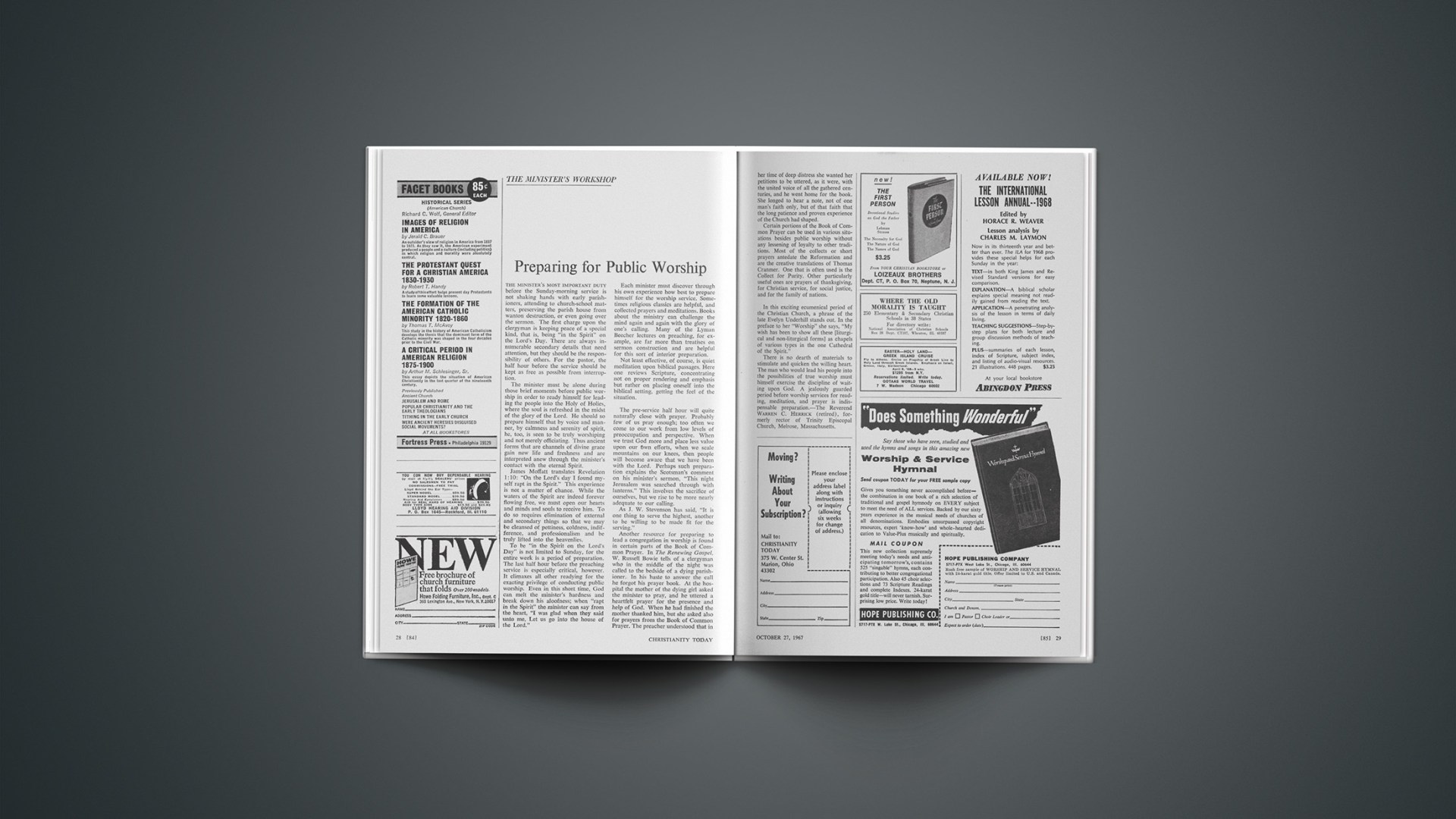The minister’s most important duty before the Sunday-morning service is not shaking hands with early parishioners, attending to church-school matters, preserving the parish house from wanton destruction, or even going over the sermon. The first charge upon the clergyman is keeping peace of a special kind, that is, being “in the Spirit” on the Lord’s Day. There are always innumerable secondary details that need attention, but they should be the responsibility of others. For the pastor, the half hour before the service should be kept as free as possible from interruption.
The minister must be alone during those brief moments before public worship in order to ready himself for leading the people into the Holy of Holies, where the soul is refreshed in the midst of the glory of the Lord. He should so prepare himself that by voice and manner, by calmness and serenity of spirit, he, too, is seen to be truly worshiping and not merely officiating. Thus ancient forms that are channels of divine grace gain new life and freshness and are interpreted anew through the minister’s contact with the eternal Spirit.
James Moffatt translates Revelation 1:10: “On the Lord’s day I found myself rapt in the Spirit.” This experience is not a matter of chance. While the waters of the Spirit are indeed forever flowing free, we must open our hearts and minds and souls to receive him. To do so requires elimination of external and secondary things so that we may be cleansed of pettiness, coldness, indifference, and professionalism and be truly lifted into the heavenlies.
To be “in the Spirit on the Lord’s Day” is not limited to Sunday, for the entire week is a period of preparation. The last half hour before the preaching service is especially critical, however. It climaxes all other readying for the exacting privilege of conducting public worship. Even in this short time, God can melt the minister’s hardness and break down his aloofness; when “rapt in the Spirit” the minister can say from the heart, “I was glad when they said unto me, Let us go into the house of the Lord.”
Each minister must discover through his own experience how best to prepare himself for the worship service. Sometimes religious classics are helpful, and collected prayers and meditations. Books about the ministry can challenge the mind again and again with the glory of one’s calling. Many of the Lyman Beecher lectures on preaching, for example, are far more than treatises on sermon construction and are helpful for this sort of interior preparation.
Not least effective, of course, is quiet meditation upon biblical passages. Here one reviews Scripture, concentrating not on proper rendering and emphasis but rather on placing oneself into the biblical setting, getting the feel of the situation.
The pre-service half hour will quite naturally close with prayer. Probably few of us pray enough; too often we come to our work from low levels of preoccupation and perspective. When we trust God more and place less value upon our own efforts, when we scale mountains on our knees, then people will become aware that we have been with the Lord. Perhaps such preparation explains the Scotsman’s comment on his minister’s sermon, “This night Jerusalem was searched through with lanterns.” This involves the sacrifice of ourselves, but we rise to be more nearly adequate to our calling.
As J. W. Stevenson has said, “It is one thing to serve the highest, another to be willing to be made fit for the serving.”
Another resource for preparing to lead a congregation in worship is found in certain parts of the Book of Common Prayer. In The Renewing Gospel, W. Russell Bowie tells of a clergyman who in the middle of the night was called to the bedside of a dying parishioner. In his haste to answer the call he forgot his prayer book. At the hospital the mother of the dying girl asked the minister to pray, and he uttered a heartfelt prayer for the presence and help of God. When he had finished the mother thanked him, but she asked also for prayers from the Book of Common Prayer. The preacher understood that in her time of deep distress she wanted her petitions to be uttered, as it were, with the united voice of all the gathered centuries, and he went home for the book. She longed to hear a note, not of one man’s faith only, but of that faith that the long patience and proven experience of the Church had shaped.
Certain portions of the Book of Common Prayer can be used in various situations besides public worship without any lessening of loyalty to other traditions. Most of the collects or short prayers antedate the Reformation and are the creative translations of Thomas Cranmer. One that is often used is the Collect for Purity. Other particularly useful ones are prayers of thanksgiving, for Christian service, for social justice, and for the family of nations.
In this exciting ecumenical period of the Christian Church, a phrase of the late Evelyn Underhill stands out. In the preface to her “Worship” she says, “My wish has been to show all these [liturgical and non-liturgical forms] as chapels of various types in the one Cathedral of the Spirit.”
There is no dearth of materials to stimulate and quicken the willing heart. The man who would lead his people into the possibilities of true worship must himself exercise the discipline of waiting upon God. A jealously guarded period before worship services for reading, meditation, and prayer is indispensable preparation.
—The Reverend WARREN C. HERRICK (retired), formerly rector of Trinity Episcopal Church, Melrose, Massachusetts.










